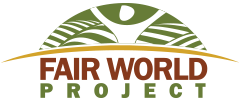The Amazon rainforest is burning at a record rate. It’s been burning for a month and making news here in the U.S. for a week now. Over the past few years, the West Coast that I call home has known a record number of fires too. This period of late summer has become fire season, fueled by drought and increasing heat, complicated symptoms of climate change and our increasing development of wild places. But the fires in the Amazon are different. In the place where I live, the links between colonialism and settlers’ misuse of land is a longer narrative. The connection to our burning forests is less immediately visible in my city.
However, there can be no doubt about it: the fires in Brazil are lit by agribusiness and fueled by our extractive capitalist economy. What does that mean for those of us who call ourselves fair trade advocates? And what can any of us do?
“Burning the Amazon is a Crime Against Humanity”
The Amazon basin is “a territory of life, food, water, and cultures,” in the words of La Via Campesina Brasil. And, they continue, “Burning the Amazon is a crime against humanity.” The magnitude of that crime is staggering. As the world’s largest rainforest, the Amazon provides 20% of our collective oxygen and houses three million species of plants and animals, roughly 10% of our planet’s biodiversity, as well as one million indigenous people. This year the number of forest fires there soared 85% compared to a year ago, with roughly half of them in the month of August alone. It’s not a coincidence nor a meteorological fluke that these fires are on the rise. Instead, this dry season can be seen as a direct consequence of President Bolsonaro’s rise to power.
Months before the fires captured global headlines, indigenous groups have been sounding the alarm, naming the situation “a legislative genocide,” as the Bolsonaro regime rolled back land rights and environmental protections and escalated attacks on indigenous land defenders. As noted in a report from Amazon Watch published in April 2019, “Brazil is the world’s deadliest country for those defending human rights and the environment, with agribusiness driving killings more than any other industry. Bolsonaro’s violent rhetoric has already been accompanied by a spike in rural violence, particularly against indigenous people and landless activists, emboldening militias controlled by powerful landowners to carry out attacks.” Whether with guns or with chainsaws, agribusiness and their land-grabbing associates are reshaping the rainforest, clearing the land and its people to make room for more profits.
Industrial Agriculture is Driving Deforestation
The leading drivers of the push for deforestation: Cattle ranching and the soy used to feed our growing appetite for industrial meat. Together, they account for 80% of Amazon deforestation. Global supply chains and commodity traders make it tough to trace one burning pile of trees directly to one meat company, one supermarket, or one burger. But the companies controlling the supply chains are the same Big Food giants: Cargill, JBS Meat, ADM (Archer Daniels Midland companies), and others—companies who play an outsized role in fueling our global climate crisis. A new report details the connections, following the flames, and the dollars, from these companies to the names we recognize: Walmart, Sysco, Costco, and others.
Defending Indigenous Rights is Key to Our Collective Survival
There is plenty of nuanced debate about the role of trade policy, U.S. farm policy, and individual choices to eat meat. Like any complex global situation, there’s no single simple solution. There is however one clear truth: Defending indigenous rights is key to protecting life on this planet. In the words of La Via Campesina Brasil:
Let us also remember that the Amazon is not a “wild” territory, but a hugely diverse region in terms of biodiversity and peoples. For thousands of years, different forms of living with this biome have produced the commons that cannot be separated from the forest. There is no Amazon rain forest without its peoples, nor do we exist without it. The conservation of the Amazon can only be possible by defending the indigenous and traditional territories, agroecology, and health care, culture, and education policies that are focused on the peoples of this region.
Around the globe, indigenous rights defenders are standing up against Big Food companies, against mining, against fossil fuel industries, against all the companies who would privatize and profit off of the land, air, and water. They are standing up against the extractive, capitalist economics that suggest that corporations have the right to extract every last ounce from communities—whether they are in Brazil, Guatemala, Hawai’i or at Standing Rock.
Researchers are finally catching up to their knowledge. A new report from the United Nations’ top climate science body, the Intergovernmental Panel on Climate Change (IPCC) states that granting indigenous and traditional landholders control of their lands is key to slowing the climate crisis. Yet too many governments around the world continue to put multinational corporations and their extractive “development” ahead of their rights. Powerful agribusiness lobbyists have rolled back laws or pushed to weaken enforcement of land rights and environmental protections. The results are devastating. Every year more environmental and land defenders, many of them indigenous, are murdered—now an average of four land defenders are killed each week, up from two 15 years ago. Their killers get off easy. And the Big Food, mining, and power companies who profit from the theft of their land and lives face even fewer consequences.
Time to Invest in a Food System with a Future
It doesn’t have to be this way. Colonial powers have a long history of pushing indigenous people off their lands—in Brazil, here in the U.S., and around the globe. But this isn’t just history. Big Ag is still expanding its reach, extracting land, water, and wellbeing from communities in the quest for bigger profits. Too often they claim that we need Big Ag to feed the world, that we need their volumes and their cheap prices. But the reality is that small-scale farmers are already feeding the majority of the world. And those cheap prices? They are an illusion. We are collectively paying a high price for what Big Food is dishing up.
To put the burden onto an individual’s choice of a burger is too simple—and allows the Big Food companies to get off the hook. We need to move away from their extractive model that is built on exploitation and the seemingly endless theft of land, labor, and lives. Around the globe, small-scale farmers, ranchers, pastoralists, and others offer thriving models of food systems that nourish communities, not impoverish them. These models, based in agroecology, stand to regenerate the soil, not slash-and-burn the forests that support life on earth. They respect the traditional skills and innovations of the people closest to the land. It’s high time we get behind this sort of food system with a future.
How to Get Involved
What can you do to support the embattled defenders of the Amazon, and indigenous rights more broadly?
- Support the work of Amazon Watch – they are supporting local efforts in the Amazon, and providing in-depth research looking at the global supply chains and the corporations and financiers who are responsible.
- Sign the petition to stop BlackRock—they are one of the largest investors in Brazil’s agribusiness industry, and their financial backing is key to the continued destruction of the Amazon.
- Join local actions in your community—find a community event for the Global Day of Action for the Amazon on September 5th.
- Support the Real Meals Campaign—we are calling on Aramark and the big cafeteria companies to drop their allegiance to Big Food and invest in a food system that is fair, humane, ecologically-responsible, and grounded in racial justice.
- Support indigenous rights where you live—lookup whose lands you are on and educate yourselves on the issues faced by indigenous communities where you live.
- Read up on other economic models—fair trade farmers, their cooperatives, and fair trade enterprises around the globe are just of a few of those who have been experimenting with community-based, solidarity economics over the past decades.

